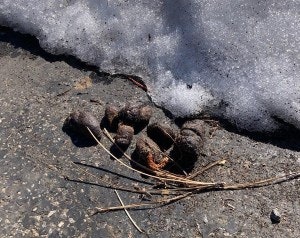Scoop Your Dog's Poop

With the snow melting, dog poop is more obvious around the neighborhood. BE RESPECTFUL of district property and residents’ yards by always picking poop up after your dog(s) as well as your poop bags when you are on District roads, trails, greenbelts, and residents’ yards and disposing of those bags properly. This helps to ensure that everyone can fully enjoy our subdivision and prevents pollution.
According to the Environmental Protection Agency, pet waste is one of the many seemingly small sources of pollution that can add up to big problems for water quality, and even human health. When dog waste is left behind, not only is it unsightly and leaves an overwhelming smell, but it can also leave excessive amounts of bacteria, parasites and nitrates that disrupt outdoor ecosystems. The best way to make sure that neighborhood and natural wildlife stay healthy is by encouraging all pet owners to pick up after their dogs and properly dispose of the waste, ideally in biodegradable bag, and then in their trash can. Read on for four reasons why it’s important to pick up your dog waste:
1. Dog poop is not natural. It is rational to think that poop is natural because we often see wildlife droppings outside. Wild animals eat nutrients from their existing ecosystem, so they are simply returning what is already there. Dogs, on the other hand, eat pet foods specifically designed to ensure a healthy diet. These pet foods can cause their poop to contain excessive amounts of bacteria and nitrates that can upset the delicate balance of an existing outdoor ecosystem.
2. Dog poop does not decompose. Dog waste will not fully break down on its own. It is logical to think that dog waste is compostable, but before dog feces fully decomposes, it will get washed over by rainwater, causing it to get into land and water systems where it releases harmful nutrients that cause excessive growth of algae in lakes, streams and rivers. This type of pollution negatively impacts wildlife and humans.
3. Dog poop contains disease causing bacteria and parasites. Dog waste contains bacteria and parasites that can contaminate water and soil and also be harmful to humans. Even if your dog does not show symptoms of being sick, their waste can carry diseases that are harmful to other animals and humans. Salmonella, E.coli and roundworms are a few of the diseases that can be found in dog poop.
4. It’s your doody to pick up after your dog. Let’s face it, picking up after your dog is not only common courtesy, but it is your responsibility. When you plan to be out and about with your dog, be prepared to clean up after them. Bring a bag with you. Also, avoid letting your dog poop within 200 feet of a body of water and do not throw dog poop into a storm drain.
Be considerate and responsible in all aspects of pet care. Never assume that solid pet waste eventually goes away just because it’s in an area far from water. Even left in wooded areas, uncollected waste ends up in our water through run-off. Picking up your dog’s poop may not be your favorite chore, but it’s an important one that helps keep our outdoor spaces, along with our community and pets safe. Source: denvergov.org
